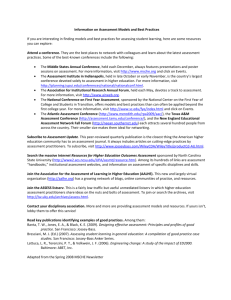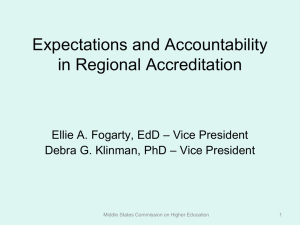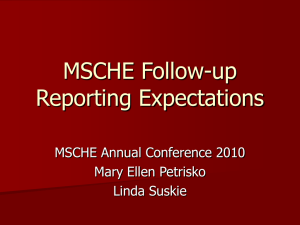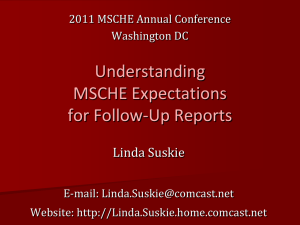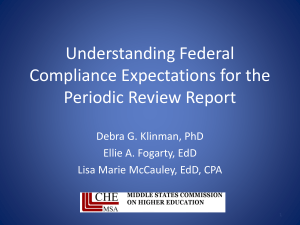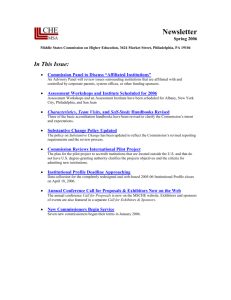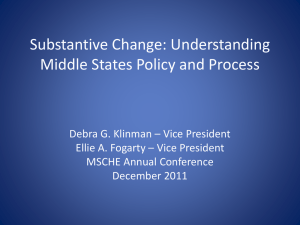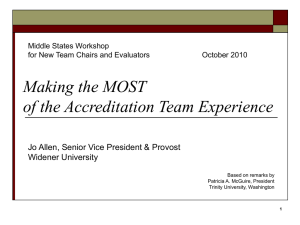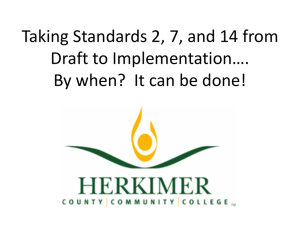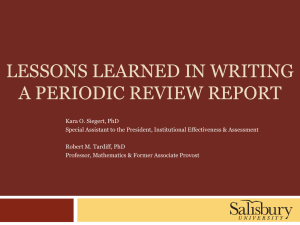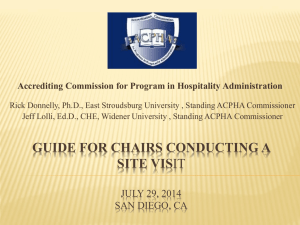Roles and Responsibilities of the Accreditation Liaison Officer (ALO)
advertisement
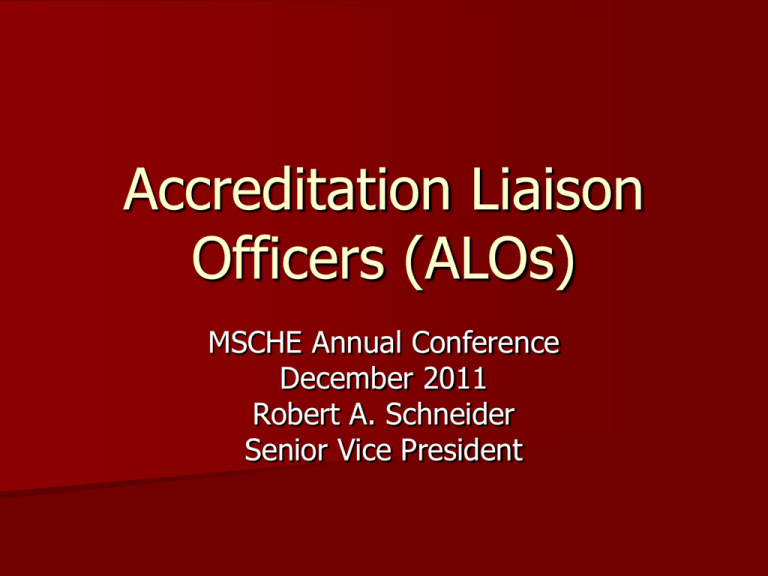
Accreditation Liaison Officers (ALOs) MSCHE Annual Conference December 2011 Robert A. Schneider Senior Vice President Who is the ALO? The primary contact with MSCHE staff A resource to the institution on accreditation issues Someone with time, knowledge and authority to engage with president and others on campus on accreditation Not the president and not a consultant ALO roles and responsibilities For Commission guidelines see: The Accreditation Liaison Officer (ALO) Role and Responsibilities http://www.msche.org/documents/6B---5-ALO-guidelines-122109.pdf For resources see: ALO Orientation e-Packet http://www.msche.org/publications/ALO-Orientation-ePacket11.pdf What does an ALO need to know? Commission Schedule Accreditation Events and Cycles Annual Reporting Requirement (IP) Follow-Up Reporting Requirements Handbooks contents Policies, Guidelines & Procedures MSCHE Website Contents ALO Newsletter Workshops, Institutes, Conferences Commission Meetings Full Commission meets early March, late June, and mid-November Takes action on recommendations following from Self-Study Evaluations, Periodic Review Reports, Follow-up Reports and Visits Actions communicated within 30 days of meetings Commission Schedule Committee meetings – Self-Study Evaluations: 3 x year – Periodic Review Reports: 4-5 x year (October) – Follow-up Reports: 3 x year – Substantive Change Requests: every other month (February, April, etc.) with deadline the first of the month before (January, March) Accreditation Events and Cycles Self-study evaluation and visit: every ten years (except newly accredited: five years after first accreditation) Periodic Review Report: five-year interim report between self-studies: always due June 1 Annual Institutional Profile: due in April of each year Annual Institutional Profile Offers evaluation teams and staff a snapshot of an institution's structure, operations, finances, and accreditation status; Enables staff to monitor an individual institution's compliance with selected aspects of accreditation standards; Annual Institutional Profile Updates the on-line member Directory of member and candidate institutions and the Statement of Accreditation Status; Provides the Commission with a basis for assessing dues; and Assists staff in developing region-wide aggregate data. Annual Institutional Profile http://www.msche.org/?Nav1=INSTITUTIONS&Na v2=IP&Nav3=INTRODUCTION Follow-up Reports Can be requested as result of self-study evaluation, periodic review report, or previous follow-up report Progress report Monitoring report Supplemental report Follow-up Reports See Guidelines: Follow-Up Reports and Visits http://www.msche.org/documents/6B---4-Follow-upreports-and-visits-guidelines-122109.pdf Know your handbooks!! Characteristics of Excellence in Higher Education: Requirements of Affiliation and Standards for Accreditation Handbook for Periodic Review Reports Self-Study: Creating a Useful Process and Report Team Visits: Conducting and Hosting an Evaluation Visit Handbooks All available on our website, http://www.msche.org/publications.asp Can also be ordered at the website http://www.msche.org/myche/public/publi cations/publicationorderform.aspx Handbooks Check handbooks for information prior to contacting the Commission staff with questions Self-studies are to be 100 pp single-spaced, 200 pp double-spaced Policies (categories) General Accreditation Policies, Guidelines, and Procedures The Peer Review Process Institutional Programs and Services Public and Government Relationships and Communication Policies (categories) International Programs Commission Administrative Procedures Complaints, Comments, and Appeals Policies See Policies, Guidelines & Procedures index: http://www.msche.org/?Nav1=POLICIES&Nav2=INDEX Policies of special note Substantive Change Policy: Substantive Change Processes: Substantive Change Visits to Branch Campuses and Additional Locations: http://www.msche.org/documents/6B---6SubstantiveChange_4_.pdf http://www.msche.org/documents/SubstantiveChange-Processes-New-Version-January2011.pdf http://www.msche.org/documents/P2.8SubChangeVisits.doc Policies of Special Note Schedule of Dues and Fees: http://www.msche.org/documents/P1.8Dues4111[1].doc Selection of Peer Evaluators: http://www.msche.org/documents/6B---3Selection-of-Peer-Evaluator-guidelines122109.pdf Policies of Special Note Contracts by Accredited and Candidate Institutions For Education-Related Services: http://www.msche.org/documents/P3.2ContractsforServices[1].doc Special note regarding policies They change! Be sure to check the website for most up-todate Changes due to HEOA, etc. MSCHE website www.msche.org Institutions Alpha order: all candidate and accredited institutions Basic directory information, institutional website link, date of accreditation and latest reaffirmation Statement of Accreditation Status and Detail View ALO Newsletter MSCHE ALO Newsletter is published five times each year: Early Fall, Early Winter, Winter, Spring, and Summer. ALO Newsletters are also archived on our website: http://www.msche.org/news_newsletter.asp MSCHE events Self-Study Institute (invitation) Periodic Review Report Workshop (invitation) Chairs and Evaluators Workshop (invitation) Annual conference Assessment Workshops Planning and Assessment Workshops Final tips Check the website regularly Check with the president’s office upon receipt of MSCHE communications to make sure they receive prompt attention Keep up with due dates for reports Communicate with constituencies as needed Get to know your Commission liaison!
